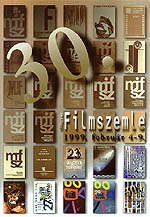 |
Vol 0, No 30
19 April 1999 |
|
|
 K I N O E Y E:
K I N O E Y E:Complete and Utter Bollok's? Csaba Bollok's Eszak, Eszak Andrew J Horton Dedicated readers of Kinoeye's coverage of the 30th Hungarian Film Week may well be starting to despair that Hungarian cinema has been irreversibly corrupted by the influence of Hollywood. All is not lost, however! The unfortunately named Csaba Bollok, under the auspices of the renowned Balazs Bela Studio, is at hand to save the day with the director's third film Eszak, Eszak (North, North, 1998), an innovative and lyrical portrait of people and the spaces between them. When Juli sets out on her bike to recharge a battery for a toy train, she embarks on a strange journey that explores her relationship with the world she lives in. As she travels further north into the hills, the snow gets thicker and thicker and reality seems further and further away. In the meantime, her father sends out Misi, who hunts in vain for Juli as she tours the icy and desolate landscape. (The film was shot amidst the harsh limestone scenery around Aggletek in the northeast of Hungary.) Between the deserted industrial relics and the wintry hills, a young robber asks if Juli would like to be his hostage and he and his gang carry her off. When she has escaped, she recovers her abandoned bicycle and sets off for the warmth of home, relocating the curiously missing battery along the way. The plot to Eszak, Eszak is difficult to describe. It has the thin, wispy qualities of a solitary cloud in the sky lacking in sharp edges, but creating a definite presence none the less. In many ways, though, the plot is irrelevant. Indeed, one of the less successful parts of the film for me was when Juli is kidnapped and Bollok feels himself compelled to place his film under some sort of imperative of action which is interesting in its own right. Negative space Eszak, Eszak's finest moments are those which unselfconsciously allow the film to drift, building up a slow and gentle portrait of its characters, their hopes, fears and desires. Just as artists talk about negative space, the shapes made between objects, not by them, so Bollok builds up his story using negative conversation, the spaces between sentences. Conversations are at cross-purposes, people fail to find what they are looking for and dreams are indistinguishable from reality. The exterior is cold and harsh against the intimacy of home, however much the characters wish to escape from it. Subtle, unpretentious and quietly innovative, Eszak, Eszak is the sort of film which is unlikely to ever get the attention it deserves. In an age where, perhaps, far too much cinema is being made, films such as Bollok's, which refuse to bow to the cinematic god of adrenaline-pumping action and high box-office success, will inevitably get submerged in a sea of dross. Its modest aims will doubtless ensure that many connoisseurs of cinema will not get to see it. There is not enough action for it to compete in high-street cinemas and the film is certainly not in any way "great" on the scale of Hungarian classics such as Angi Vera, Apa (Father) and Valahol Europaban (Somewhere in Europe) and will, therefore, fail to attract the attention of the international art-house crowd. However, it is a "good" film, and in this day and age, that is something to be thankful for. If more Hungarian directors tried to make "good" films and did it well - as Bollok has done - rather than attempting to create "great" films and making a right pig's ear of it, Hungarian cinema would be far more worthy of attention. Andrew J Horton, 19 April 1999 (republished 13 December 1999) Click here for an interview with Csaba Bollok.
|
| |||||||||||||
![]()
Copyright (c) 1999 - Central Europe Review and Internet servis, a.s.
All Rights
Reserved